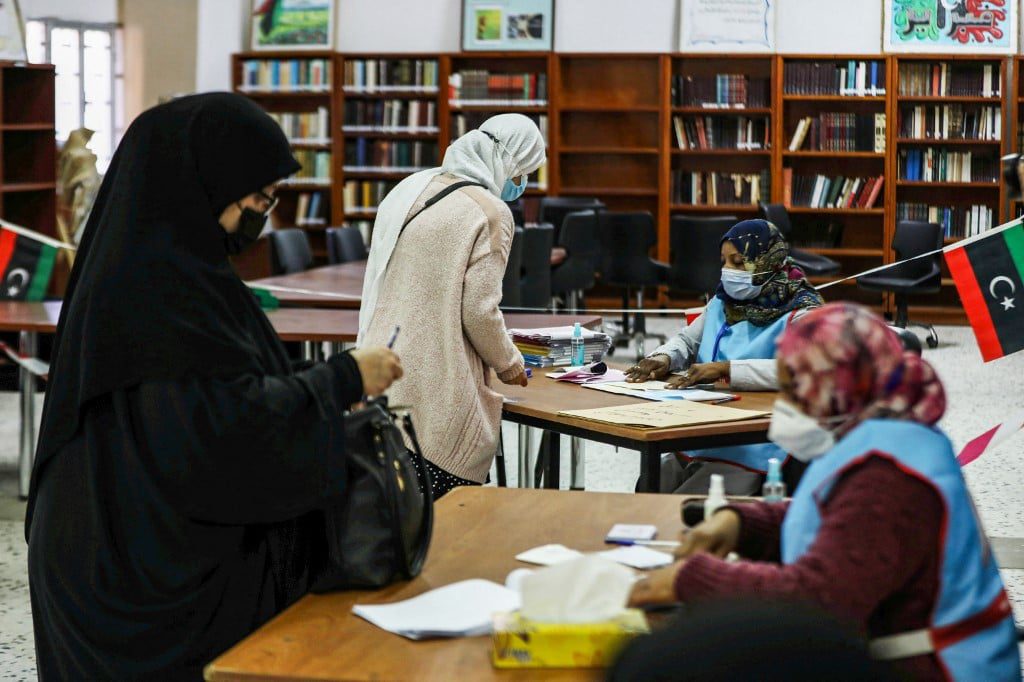
By: Mat Nashed
The U.N-led Libyan Political Dialogue Forum (LPDF) voted for a surprising new government on February 5, 2021. Diplomats were expecting the joint ticket of Fathi Bashagha and Aguila Saleh to claim victory. The former is the Turkish-backed Interior Minister from the previous government in the capital of Tripoli, while the latter is supported by the Kremlin and remains the Speaker of the eastern-based House of Representatives.
Bashagha and Saleh were traditional rivals, yet Moscow and Ankara were counting on the joint ticket to secure their economic and security interests. The two powers must now reassess their leverage in Libya after Hameed Debiba and Mohammed el-Menfi secured 53 percent of the vote from delegates in the LPDF.
Debiba will take over as Prime Minister, while Menfi assumes leadership of the three-member Presidential Council. The two men are faced with the daunting task of preparing the country for elections in December 2021 and unifying Libya’s fractured institutions.
Experts believe that the new Government of National unity (GNU) will be dogged by the same challenges as the previous Government of National Accord (GNA), which was formed out of U.N peace talks in December 2015. The GNA failed to obtain approval from the HoR, reign in militias that pillaged public institutions, and win legitimacy among many Libyans that saw the body as subservient to foreign interests.
One key difference is that the GNU can technically bypass approval from the HoR by obtaining legitimacy from the LPDF, yet that would exacerbate fractures on the ground. Saleh’s foreign backers, and most notably Egypt, have also affirmed that they will only endorse the GNU with their client’s approval.
Enter Debiba, who is a tycoon and a relic from the era of slain dictator Muammar Gaddafi. He will try to co-opt potential spoilers by forming delicate alliances across the country. Helping Debiba is that he carries little ideological baggage, yet critics fear that he will use his power to enrich himself and his close circle. One U.N official told the Economist that Debiba will “try to get as much as he can.”
Some diplomats compare Debiba to the slain Lebanese tycoon, Rafik Hariri, who was accused of embezzlement while rebuilding his war-torn country through a myriad of privatization schemes. Debiba may be more cunning after demonstrating an ability to exploit the discontent and grievances of his peers in Libya’s messy political landscape. He cleverly won the support of the rogue General Khalifa Haftar who ordered his allies in the LPDF to back Debiba. Doing so undermined Saleh, who was the civilian face of Haftar’s military dictatorship in the east for the past five years.
Relations between Haftar and Saleh have been rocky since the former sabotaged the U.N-led peace process in 2019 by launching a failed offensive to retake Tripoli. That blunder cost Haftar territory and favour with Moscow, which quickly pivoted to support Saleh. Now Haftar has regained political relevance thanks to Saleh’s defeat in the LPDF.
Tariq Megerisi, a Libya expert with the European Council for Foreign Relations (ECFR), writes that Haftar seems to think that he will become the next defence minister after helping Debiba become Prime Minister. Debiba also apparently promised Turkey that it will retain their favored defense minister Salah Eddine al-Namrush. The new Prime Minister already seems to have made more promises than he can keep.
“Debiba’s vision is of a government big enough to placate everyone – despite advice from the US and others to prioritise a small, technocratic leadership that focuses on the election of its replacement in ten months,” writes Megerisi.
Whatever concessions Haftar is offered, placating the general will be a real challenge. Emadeddin Badi and Wolfram Lacher, two experts respectively from the Atlantic Council and the German Institute for International and Security Affairs (SWP), argue that Haftar cannot afford to fully accept the new authority since he needs enemies in the west to justify his near-total control over the east.
“Haftar could maintain an ambivalent attitude towards the new body, occasionally veering towards open hostility, while maximally exploiting the opportunities the new structure offers,” writes Badi and Lacher for Carnegie Endowment.
Menfi, an easterner and a former diplomat that was expelled from Greece in 2019, will try to make inroads with Haftar and civilian authorities in the east. The new head of the Presidential Council already met with Haftar’s self-styled Libyan Arab Armed Forces (LAAF) last week to speak about his priorities. Unifying the military, repairing state institutions, and fostering national reconciliation are at the top of his agenda.
Anas Al Gomati, the director of the Sadeq Institute, tweeted that Menfi will either “take control of and restructure the LAAF to ensure its political subservience, or he will be co-opted, politically enable the LAAF and erode the meaning of a civilian Presidency.”
For now, any deal to unify the army seems impossible. Armed factions in western Libya remain united in their abhorrence of Haftar, while the eastern General will settle for nothing less than total control over the military.
Debiba and Menfi also need to assert themselves over rival personalities in the west. Bashagha, in particular, could be a difficult partner following his embarrassing defeat. Just the same, the broad hostility that Tripoli’s armed groups have towards Bashagha – who threatened their mafia like control of civilian institutions – could enable the GNU to accommodate his many opponents.
As for Ankara and Moscow, neither country needs to hit the panic button. Debiba has strong business ties with Turkey and recently pledged ‘great solidarity with the Turkish people and state.” Russia is cynically pragmatic and ready to cooperate with new leaders to secure its interests. Rival politicians in western Libya are already competing for the Kremlin’s favour, but who Moscow props up next is a mystery.
All that’s certain is that Libya remains divided under the Government of National unity.


